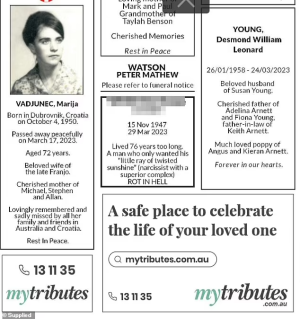No love lost? Family of deceased Adelaide man publishes ‘brutally honest’ obituary
- Replies 10
Obituaries are a unique form of tribute, serving as a final farewell to the departed. These memorials often celebrate the deceased's life, highlighting their contributions to society, their achievements, and their impact on the people around them.
But in today's world, obituaries have taken on a new tone - one that is raw, honest, and sometimes, even shocking.
Gone are the days of sugarcoating the truth in obituaries. Instead, people are choosing to write brutally honest and unfiltered accounts of their loved ones' lives. These obituaries don't hold back, even if it means airing the deceased's dirty laundry or sharing the harsh realities of their life.

In what can only be described as a jaw-dropping example of this new trend, a recent obituary published in one of the country's largest newspapers took the internet by storm.
The scathing death notice for a 76-year-old South Australian man shocked readers with its unflinching portrayal of the deceased.
Instead of a typical eulogy filled with heartfelt condolences and fond memories, this obituary was a searing indictment of the man's character. It contained an unapologetic message that left no room for niceties or platitudes.
In a mere 24 words, the author expressed their seething dislike for the departed, stating that he had lived 76 years too long and wished him to 'rot in hell'.
But the biting message didn't stop there. The author went on to describe the man as a 'little ray of twisted sunshine' – a scathing reference to his apparent narcissistic attitude.
The shocking obituary was briefly published online but has since been removed from the newspaper's website. However, an online version revealed even more disturbing details about the deceased.
Allegedly, the man had abandoned four of his children, leaving them to fend for themselves, while his fifth child was labelled a 'controlling narcissist'.
If you're wondering where it all started, well, it turns out that the original 'mean' obituary was written over a decade ago for a woman named Dolores Aguilar.
Though obituaries have always had a reputation for being sentimental and overly positive, Dolores' death notice went in the complete opposite direction, exposing the alleged dark side of her character.
In 2008, Dolores Aguilar passed away, leaving behind a family that was seemingly less than fond of her. And when it came time to write her obituary, they didn't hold back. Instead of praising her virtues, the obituary described the sad and troubling times that she had put her family through.
'Her family will remember Dolores, and amongst ourselves, we will remember her in our own way, which was mostly sad and troubling times throughout the years,' it reads.
'We may have some fond memories of her, and perhaps we will think of those times too. But I truly believe at the end of the day, ALL of us will really only miss what we never had, a good and kind mother, grandmother and great-grandmother.'
'I hope she is finally at peace with herself. As for the rest of us left behind, I hope this is the beginning of a time of healing and learning to be a family again.'

The scathing tribute went viral, and to this day, it remains one of the most infamous obituaries ever written. It even inspired copycats, with other people using it as a template for their own mean-spirited death notices.
It's worth noting that while obituaries have been around for centuries, it's only in the last few decades or so that they've become a common practice to archive them online. And with the rise of social media, obituaries have become even more visible, making it easier for them to be read by others.
Dolores' and the Adelaide man's obituaries serve as a stark reminder that even in death, our actions and character can leave a lasting impact on those we leave behind.
So the next time you read an obituary, remember that it's not just a simple tribute to a life lived but also a reflection of the complicated and often messy relationships the person had with their loved ones.

As we've seen, obituaries have come a long way since their inception. What used to be a simple announcement of a person's death has evolved into a reflection of their life, their impact on others, and even their flaws and shortcomings.
But what does this trend towards 'mean' obituaries say about our society and our values? Are we becoming more honest and authentic in our grief, or are we simply using obituaries as a way to air our grievances and settle scores?
Do they offer a true reflection of the person's life, or are they simply a way to put a spin on a difficult situation? Are these words a celebration of their life or a scathing critique of the person's character?

Regardless of your stance on this controversial obituary, we extend our sympathies to all who have lost loved ones and hope that fond memories bring you comfort during difficult times. And we hope that your own final tributes are filled with love, respect and the reflection of the happiness you brought to your friends and family.
What are your thoughts on this, members? Let us know in the comments.
But in today's world, obituaries have taken on a new tone - one that is raw, honest, and sometimes, even shocking.
Gone are the days of sugarcoating the truth in obituaries. Instead, people are choosing to write brutally honest and unfiltered accounts of their loved ones' lives. These obituaries don't hold back, even if it means airing the deceased's dirty laundry or sharing the harsh realities of their life.

An Australian who died at the age of 76 has received a scathing obituary published in one of the country's largest newspapers. Credit: Unsplash/Sandy Millar.
In what can only be described as a jaw-dropping example of this new trend, a recent obituary published in one of the country's largest newspapers took the internet by storm.
The scathing death notice for a 76-year-old South Australian man shocked readers with its unflinching portrayal of the deceased.
Instead of a typical eulogy filled with heartfelt condolences and fond memories, this obituary was a searing indictment of the man's character. It contained an unapologetic message that left no room for niceties or platitudes.
In a mere 24 words, the author expressed their seething dislike for the departed, stating that he had lived 76 years too long and wished him to 'rot in hell'.
But the biting message didn't stop there. The author went on to describe the man as a 'little ray of twisted sunshine' – a scathing reference to his apparent narcissistic attitude.
The shocking obituary was briefly published online but has since been removed from the newspaper's website. However, an online version revealed even more disturbing details about the deceased.
Allegedly, the man had abandoned four of his children, leaving them to fend for themselves, while his fifth child was labelled a 'controlling narcissist'.
If you're wondering where it all started, well, it turns out that the original 'mean' obituary was written over a decade ago for a woman named Dolores Aguilar.
Though obituaries have always had a reputation for being sentimental and overly positive, Dolores' death notice went in the complete opposite direction, exposing the alleged dark side of her character.
In 2008, Dolores Aguilar passed away, leaving behind a family that was seemingly less than fond of her. And when it came time to write her obituary, they didn't hold back. Instead of praising her virtues, the obituary described the sad and troubling times that she had put her family through.
'Her family will remember Dolores, and amongst ourselves, we will remember her in our own way, which was mostly sad and troubling times throughout the years,' it reads.
'We may have some fond memories of her, and perhaps we will think of those times too. But I truly believe at the end of the day, ALL of us will really only miss what we never had, a good and kind mother, grandmother and great-grandmother.'
'I hope she is finally at peace with herself. As for the rest of us left behind, I hope this is the beginning of a time of healing and learning to be a family again.'

Dolores Aguilar's obituary is said to be the 'original' mean obituary. Credit: Unsplash/Mike Labrum.
The scathing tribute went viral, and to this day, it remains one of the most infamous obituaries ever written. It even inspired copycats, with other people using it as a template for their own mean-spirited death notices.
It's worth noting that while obituaries have been around for centuries, it's only in the last few decades or so that they've become a common practice to archive them online. And with the rise of social media, obituaries have become even more visible, making it easier for them to be read by others.
Dolores' and the Adelaide man's obituaries serve as a stark reminder that even in death, our actions and character can leave a lasting impact on those we leave behind.
So the next time you read an obituary, remember that it's not just a simple tribute to a life lived but also a reflection of the complicated and often messy relationships the person had with their loved ones.
Key Takeaways
- The trend of 'mean' obituaries has emerged, where the deceased are criticised and their flaws exposed.
- One example is the scathing obituary of an Adelaide man who was reportedly hated by his family after he was described as someone who lived '76 years too long'.
As we've seen, obituaries have come a long way since their inception. What used to be a simple announcement of a person's death has evolved into a reflection of their life, their impact on others, and even their flaws and shortcomings.
But what does this trend towards 'mean' obituaries say about our society and our values? Are we becoming more honest and authentic in our grief, or are we simply using obituaries as a way to air our grievances and settle scores?
Do they offer a true reflection of the person's life, or are they simply a way to put a spin on a difficult situation? Are these words a celebration of their life or a scathing critique of the person's character?

With the rise of social media, obituaries have become even more visible, making it easier for them to be read by many people. Credit: Unsplash/Nick Fewings.
Regardless of your stance on this controversial obituary, we extend our sympathies to all who have lost loved ones and hope that fond memories bring you comfort during difficult times. And we hope that your own final tributes are filled with love, respect and the reflection of the happiness you brought to your friends and family.
What are your thoughts on this, members? Let us know in the comments.









